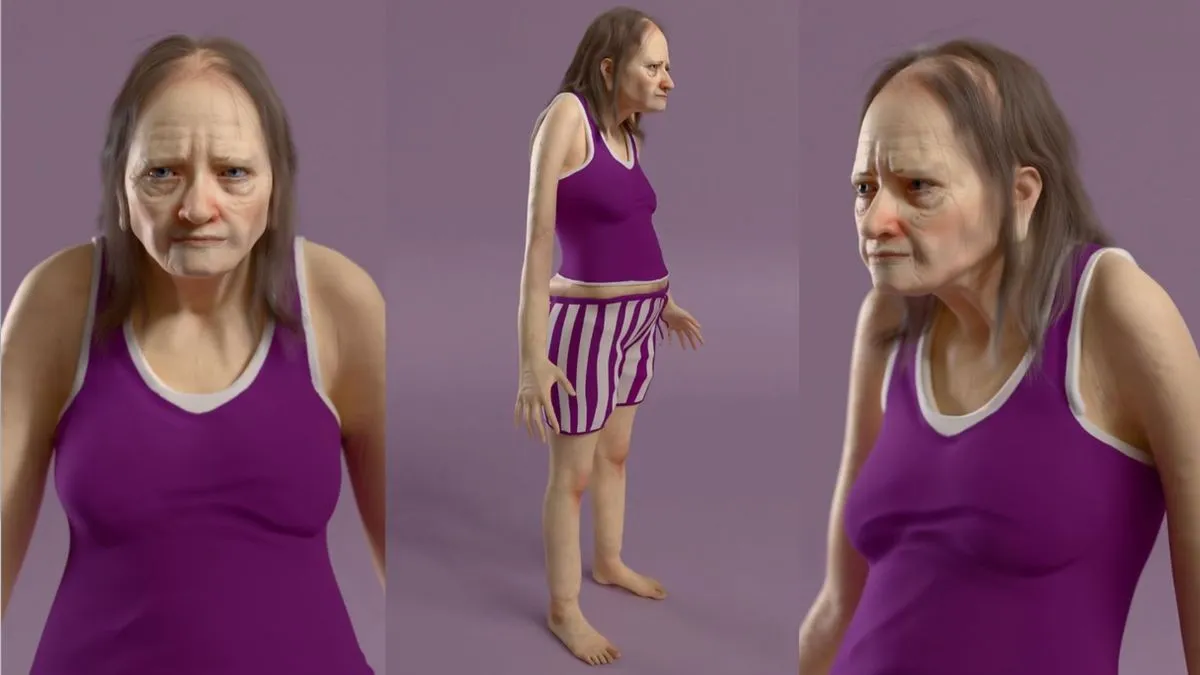Sleep is a fundamental pillar of health, yet modern lifestyles and relentless schedules are eroding its importance. By 2050, the long-term effects of chronic sleep deprivation could drastically alter human appearance and health, as exemplified by ‘Hannah,’ a haunting digital model created to raise awareness about the consequences of inadequate sleep.
A collaboration between Bensons for Beds and sleep expert Dr. Sophie Bostock, Hannah vividly illustrates the toll of insufficient rest on the human body. Her grotesque depiction serves as a grim reminder of what may lie ahead for those who consistently sleep less than six hours per night.
The Grim Reality of Sleep Deprivation
Hannah is modeled as a 45-year-old British woman living in the year 2050. Her appearance is a chilling amalgamation of the health problems linked to chronic sleep deprivation.
Thinning hair, sagging skin, swollen legs, red and baggy eyes, and muscle loss are just some of the visible signs. Beneath the surface, the damage runs even deeper, including weakened immunity, hormone disruption, and an increased vulnerability to chronic illnesses.
Created using insights from 19 scientific studies, Hannah’s alarming transformation demonstrates how prolonged sleep deficiency accelerates aging and exacerbates health issues.
Read : Bank Employee Falls Asleep on Keyboard and Transfers $267 Million Instead of $67.69 in Germany
Her story is a powerful warning about the necessity of prioritizing rest in our increasingly fast-paced world. Experts recommend that adults sleep between seven and nine hours per night to maintain optimal health, yet the prevalence of insufficient sleep is on the rise.
Read : Emerging Health Challenges: Exploring the Top 10 widely Growing Diseases in the Modern World
Modern technology, particularly the overuse of smartphones and digital devices, is significantly contributing to sleep loss. The blue light emitted by screens disrupts circadian rhythms, the 24-hour cycles that regulate physiological processes, including sleep. As our reliance on technology grows, the consequences of ignoring proper sleep habits are becoming more apparent.
How Sleep Deprivation Transforms the Body
The most jarring aspect of Hannah’s representation is the physical toll that sleep deprivation takes on the body. Chronic back pain plagues her, a result of reduced physical activity and poor posture due to fatigue. Swollen legs hint at circulatory problems, while her thinning hair and sagging skin are clear markers of premature aging.
Inadequate sleep weakens the immune system, leaving Hannah prone to frequent illnesses. This compromised immunity not only makes her susceptible to colds and flu but also increases the risk of more severe infections and chronic conditions.
Muscle thinning in her arms and legs reflects the loss of physical strength and endurance, a direct consequence of reduced activity levels and disrupted muscle repair during sleep.

Hannah’s weight gain, particularly around her abdomen, is a byproduct of hormonal imbalance caused by insufficient sleep. Leptin, the hormone responsible for signaling fullness, decreases, while ghrelin, the hormone that stimulates appetite, rises. This imbalance leads to late-night snacking and overeating, further exacerbating her physical health decline.
Furthermore, poor sleep affects skin health by reducing the body’s ability to repair damaged tissues. Collagen production, which maintains skin elasticity, is hindered, resulting in wrinkles and sagging. Hannah’s red and baggy eyes are telltale signs of chronic fatigue, a condition that affects millions today and is likely to worsen in the future.
The Cognitive and Emotional Toll of Sleep Deficiency
While Hannah’s physical changes are shocking, the impact of sleep deprivation on her mental health is equally concerning. Sleep plays a critical role in memory consolidation, the process by which the brain forms connections to store and retain information. Without adequate rest, Hannah struggles with impaired cognitive function, affecting her short-term and long-term memory.
This cognitive decline extends to her ability to focus, solve problems, and make decisions. Inadequate sleep also disrupts the brain’s emotional regulation, leaving Hannah prone to mood swings, irritability, and heightened stress. Over time, these issues can contribute to mental health disorders such as depression and anxiety, further diminishing her quality of life.

In addition to its psychological effects, sleep deprivation has severe consequences for overall brain health. Studies have linked chronic sleep loss to an increased risk of neurodegenerative diseases like Alzheimer’s. By 2050, the cumulative impact of insufficient sleep could lead to a surge in these conditions, placing an immense burden on healthcare systems worldwide.
A Wake-Up Call for a Sleep-Deprived World
Hannah’s disturbing appearance is not merely a work of fiction; it is a stark representation of a growing public health crisis. The evidence is clear: sleep deprivation is not just a minor inconvenience but a serious threat to physical and mental well-being.
As the demands of modern life continue to grow, it is crucial to recognize the value of rest and take proactive steps to protect it.
The first step is understanding the importance of sleep hygiene. Establishing consistent sleep schedules, reducing screen time before bed, and creating a comfortable sleep environment can significantly improve the quality and duration of rest.

Public awareness campaigns, workplace policies, and educational programs are also essential to promote healthy sleep habits and combat the stigma surrounding rest.
In conclusion, Hannah’s grotesque transformation serves as a powerful reminder of the consequences of neglecting sleep. Her story is a cautionary tale for a world that increasingly prioritizes productivity over health.
By addressing the root causes of sleep deprivation and making sleep a priority, we can prevent the future that Hannah represents and ensure a healthier, more balanced society for generations to come.

